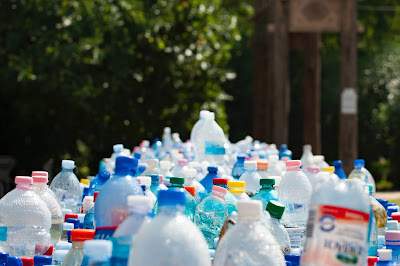Most eco-conscious shoppers try to avoid plastic where possible and willingly recycle the plastic that they reluctantly use. We've all watched in both horror and dismay at the scenes of aquatic life tangled in plastic waste as discarded bottles, carrier bags, straws and cups float around in the ocean. Humans have turned once pristine areas into cesspits, and a combination of greenwashing, deceit, apathy and short-term profits ensures that plastic pollution continues apace. A quick look around supermarket shelves is proof of their general indifference to the problem, from bananas wrapped in cling-film to the occasional ignoramuses bemoaning the 10p cost of a plastic bag.
The UK is one of the worst offenders in the world
There are many well-intentioned and increasingly successful eco-friendly plastic alternatives being developed and trialled, but these have yet to make a meaningful impact in tackling the problem. In the meantime, the plastic pollution problem continues to grow and micro-plastics are now found throughout the entire food chain with uncertainty around the future health implications. The UK produces more plastic waste per person than almost any other country in the world according to Greenpeace.
Single-use plastic is the problem
Clearly all plastic is a problem because of the hundreds of years it takes to break down, including the microplastics that are now in everything we eat. Everything being in the literal sense, including breast milk. However, single-use plastic is a particular problem. As Greenpeace has stated, “The problem isn’t that people aren’t recycling enough. The problem is that there is still far too much throwaway plastic being produced.” To put that in perspective, its estimated that over 90% of the plastic we use each year is single-use packaging, according to the Everyday Plastic report conducted by Dr Julie Schneider. In other words, the plastic pollution problem is overwhelmingly a single-use plastic problem.
What can be done about the problem?
There is clearly much greenwash going on. Banning plastic cotton bud sticks, plastic straws and charging 10p per carrier bag have a limited impact and are more about giving the impression that action is being taken. For example, according to Recycle Facts the UK alone uses 7.7 billion plastic bottles per year - a plastic bottle deposit return scheme would make a huge difference but has been repeatedly delayed.
Greenpeace has shown that if the UK produced half as much single-use plastic, we could end waste exports, and send less plastic into incineration and landfill. To achieve this the government would need to commit to a 50% reduction in single-use plastic by 2025 – and supermarkets and major brands must deliver it if we’re going to properly protect people and the planet from plastic pollution.
Where does the plastic end up?
It's great to see so many people recycling plastic waste but it's worth bearing in mind that most of the UK's household plastic packaging is sent abroad and in many cases to countries with very low recycling rates, where it is being dumped in rivers or burned illegally. We need to see real, effective action being taken to reduce single-use plastic to protect the planet for future generations.


